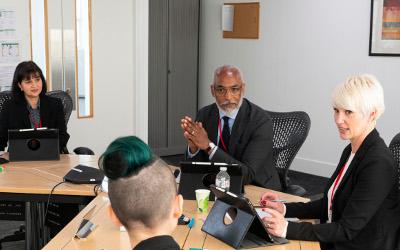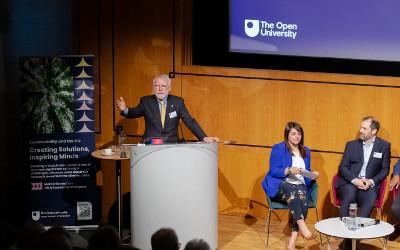You are here
- Home
- Improving the experience of witnesses in health and care professional practice proceedings
Improving the experience of witnesses in health and care professional practice proceedings

The National Institute for Health Research (NIHR) has awarded researchers from The Open University (OU), Manchester Metropolitan University, the Universities of Oxford, Glasgow and Edinburgh more than £141,000 to expand their world-first study of witnesses’ experience of giving evidence during health and social care workers’ professional conduct hearings.
The additional funding follows the NIHR’s award of close to £750,000 to the project in 2021. It will enable a new focus on the professionals regulated by the Scottish Social Services Council (SSSC), which covers 7.7% of the Scottish workforce.
The project, Witness to harm, holding to account: Improving patient, family and colleague witnesses’ experiences of Fitness to Practise proceedings, mainly focuses on cases where there are allegations of harm. This focus should help regulators and employers identify potential improvements to support witnesses whose role in giving evidence is crucial to a fair hearing.
New focus
Since September 2021, the project has explored the experiences of witnesses involved in Fitness to Practise (FtP) proceedings with UK health and social care regulators. It aims to determine what support witnesses expect, what they receive and what they need. The researchers are exploring current best practice and potential improvements to how the public engages with FtP processes to develop workable recommendations, videos and other support resources for the public and professional bodies.
Including SSSC’s s cases will add Scottish social workers and workers in social care, child care, housing and criminal justice systems to the project. In addition, the researchers will engage with employers and service users in sharing results and developing an animation to communicate key messages to all regulators, regulatory lawyers and professional bodies, health and social care educators and employers.
Co-Principal Investigator from The Open University, Professor Louise Wallace said: “We aim to find what the public expects and what they experience when they agree to give evidence about the care they received from a professional, particularly when it has been alleged that the care they received from the registrant caused them lasting harm. We know that “victims” in criminal court hearings can suffer harm all over again by having to relive their experience. There is no independent research on what happens when people give evidence in a professional regulatory tribunal, or whether the support offered by regulators to witnesses helps them or could be improved. Service users of the SSSC will include some of the most vulnerable. They may have suffered physical, sexual, or financial psychological harm, failures to safeguard, moral injury and violation of their rights. Our study aims to gain unique insights and, from these findings, create resources and guidance that enables people to be better supported when they engage with fitness to practise proceedings.”
Co-Principal Investigator from Manchester Metropolitan University, Professor Sara Ryan said: “Little is known about the experiences of being a witness at a Fitness to Practise hearing, particularly for members of the public who have experienced harm and for whom the tribunal process can generate further distress. This comprehensive study involving researchers from five universities, family members and human rights and patient safety organisations will address this gap and produce resources to better support those involved.”
Co-Investigator from the University of Glasgow, Professor Rosalind Searle said: “It is so important to have independent research that allows those who are called to be witnesses to be asked to give their insights into processes which can deeply affect them, and more significantly unnecessarily, add to their distress. It is a privilege to work on this project adding expertise by retrospective study of a range of these cases to understand what has occurred, and more importantly, how these people can be better supported and processes improved.”
Co-Investigator from The University of Edinburgh, Annie Sorbie said: “The provision of written and oral evidence by witnesses is a crucial part of the fitness to practise process. This helps to ensure that when regulators make decisions about whether health and care professionals are fit to practise, these are fair, timely and protect the public. Our study will provide novel insights into the experiences of witnesses and use these findings to create resources and guidance that enable people to be better supported when they provide evidence. I will be producing a report comparing the systems of regulation of the devolved Scottish government and the public’s involvement in professional regulation. I am delighted to work on this NIHR-funded project with colleagues across the UK and from a range of disciplinary backgrounds.”
How Fitness to Practise investigations currently work
Suppose someone alleges a professional health or social care worker has failed to meet their regulator’s standards. In that case, they may face a FtP investigation and, in some cases, a hearing (tribunal) to decide whether they are fit to practice and whether to impose sanctions to protect the public. Although rare compared to the number of health and social care workers, around 2,700 cases per year make it to a final hearing across all statutory health and care regulators in the UK.
Distress caused by recalling traumatic events in hearings
FtP proceedings can call witnesses to misconduct to give either written or oral evidence or both. These might include patients, service users and colleagues who provide evidence about significant harm they or someone else have suffered, such as sexual abuse, violence, failure to safeguard, harassment, theft or lasting clinical harm. Research on victims who give evidence in criminal courts in cases of sexual harm suggests that the re-telling and questioning involved can be a harrowing experience for some. However, there is no similar evidence on the impact of FtP proceedings on patients and service users, family and colleague witnesses, how they experience support from the regulator and what they find helpful. This support is vital because recalling traumatic events within these hearings can be deeply distressing.
Sarah Seddon of the Harmed Patient’s Alliance, who advises the project, has blogged about her experience of being cross-examined as a witness after her baby was stillborn as “an attempt to annihilate me. He blames, belittles, bullies and tries to confuse me. He fabricates scenarios and suggests that I was too busy for my unborn baby and that I should have known something was wrong with my midwife’s advice. I had no idea the process would be this brutal".
Clear and timely witness evidence is also vital to help regulators decide professionals’ fitness to practise fairly and expediently.
You may also be interested in:
This independent research is funded by the National Institute for Health Research (NIHR) under its Health Services and Delivery Research Programme (NIHR 131322). The views expressed are those of the authors, and not necessarily those of the NHS, the NIHR or the Department of Health and Social Care.
Quarterly Review of Research
Read our Quarterly Review of Research to learn about our latest quality academic output.

Contact our news team
For all out of hours enquiries, please telephone +44 (0)7901 515891
